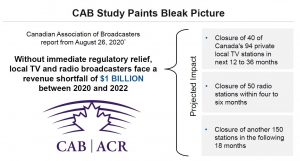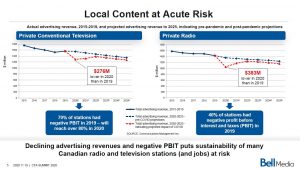
By Greg O’Brien
TORONTO – While pleased to see some recent positive signs from the federal government which may help preserve traditional local media like TV and radio stations, Bell Media’s Nikki Moffat told delegates of the Canadian Telecom Summit on Thursday more needs to happen, more quickly.
The president, radio and local TV and SVP finance decried how huge foreign media streaming giants, which “don’t pay tax” are driving down revenues and consumption of Canadian media. “The result of these global entrants is driving down consumption of domestic video (which) went from 83% in 2011 and now eight years later consumption is reduced to 57%,” she said.
“Similarly in audio, consumption of domestic players went from 52% to 30% in a four year period to streaming players, such as Spotify.”
Even while her company and other broadcasters do the hard work of producing local news, which is drawing massive viewership during the pandemic, it isn’t paying off with increased ad sales. “The economics are more and more challenging. Advertising revenues were declining already pre-Covid, and now… at even more of an alarming rate. In 2019, 70% of TV stations and 40% of radio stations were losing money. The sustainability of these stations and jobs are at risk,” said Moffat (pictured above in a screen cap of the virtual event).
“Local media creates a community. It informs, and it engages. Local journalism is critical in times of crisis and we’re certainly seeing that this year (but) the monetization of these digital viewers is a fraction of those in our traditional ecosystem.”
While radio and TV broadcasters have tried to move forward, doing more with less where, for example, all journalists are now writers, shooters, editors and producers and radio stations are grouped under one brand (such as Bell Media’s 13-station chain Pure Country), it’s not enough because the regulations are not the same for the foreign streamers.
The changes to the Broadcasting Act, proposed by Bill C-10 are “long overdue,” she added. “The recognition that there needs to be a level playing field in the Canadian broadcasting as between domestic players, large and small and global internet giants, is key… No global player should have an advantage over domestic player in our own country.”
Without immediate regulatory relief, local TV and radio broadcasters will face significant revenue shortfalls and stations will close by the dozens as the industry will lose $1 billion in revenue between 2020 and 2022, she projected, backed by a report from the Canadian Association of Broadcasters. See below.





